#jialiang
Text
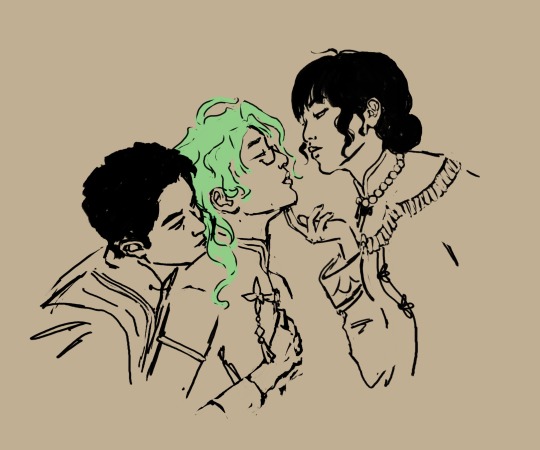
when you are all dying in different ways for different reasons and you are all trying to save each other and two of you are married and the other is your family doctor. is this anything
[image ID: a digital drawing of baizhu from genshin impact in between two npcs, jialiang and jiangli. jialiang is hugging baizhu from behind and looking up at jiangli. jiangli is tipping baizhu's chin towards her and leaning into him. the background is tan and baizhu's green hair is the only other color. /end ID]
#it aint easy being the only person in the universe who likes a ship👍 but im doing my part#baizhu#genshin impact#im literally tagging the npcs#jiangli#jialiang#and im making their ship name#baijiajia#baizhu spoilers#quilfish art. no. yep.#pc x npc
65 notes
·
View notes
Text
You know, thinking about it, if people from the Xianzhou alliance were to meet Baizhu, I would totally believe them being practically Baizhu antis
Like, Baizhus searching for immortality, which is basically one of the Xianzhous top taboos. Doesn’t matter his reasoning. If they arent’ actively trying to arrest him, they’d at least keep a very close eye on him.
And thats not even mentioning Jialiang and Baizhi bringing him back from the dead as a zombie, and to a lesser extent his interest in Qiqi
#Genshin impact#honkai star rail#baizhu#jialiang#qiqi#xianzhou luofu#genshin impact meta#genshin impact headcanons
21 notes
·
View notes
Text

Parson's Chameleon (Calumma parsonii), male, family Chamaeleonidae, Island of Sainte Marie, Madagascar
The heaviest chameleon, weighing in at up to 700 g. One of the longest chameleons, growing to a length of up to 65 cm (26 in) in total length.
photograph by Jialiang Gao
292 notes
·
View notes
Text
Light on Series: Sisyphus whump list (cn)

I took over this list from @love-me-a-lotta-whump so go check out their awesome whump lists if you're looking for some good whumpy series to watch! ;)
Synopsis:
After his daughter Duo Duo dies, Zhang Hai Feng quits his job as a police officer. However, he cannot continue his peaceful life for long because a serial murder case reveals new evidence about the accident that led to Duo Duo's death. Zhang Hai Feng pursues the serial murderer and dies with him. When he wakes up, he is back to the day before he dies and decides to make use of the wormhole to save Duo Duo. Eventually, he starts to unravel the deeply hidden secrets of the people around him and the web of conspiracy that was planted 20 years ago. (paraphrased from KissAsian)
Genre: Crime, Mystery, Sci-fi
Whumpees:
Zhao Bin Bin played by Lu Han
Zhang Hai Feng played by Wang Qian Yuan
Other whumpees listed in orange
TW: SUICIDE, MURDER, DEATH
MAJOR SPOILERS BELOW
01:
Zhao Bin Bin:
09:18 - 11:20 - in an interrogation room, interrogated, defiant
16:49 - 19:41 - in an interrogation room, stressed, crying, (flashback: panicked), manhandled, choked, coughing
21:20 - 22:37 - poisoned, chest pain, seizing, foaming at the mouth, rolled into the hospital, handcuffed to a stretcher, unconscious, still handcuffed to the stretcher, unconscious, dazed, weak
29:35 - 30:00 - headbutted (is that a word?), falls backwards, sort of falls of a building, dies
Zhang Hai Feng:
11:20 - 20:48 - depressed, drinking, angry, chokes someone, manhandled, taken away
28:00 - 30:00 - out of breath, dealing with a hostage situation that also includes a bomb, bluffing, shot at, shot in the chest, bomb explodes, dies
02:
Zhao Bin Bin:
07:40 - 08:33 - chased
Fu Jialiang:
13:40 - end of episode - drugged, kidnapped, tied up and duct tape on his mouth, panicked, yelling, has a bomb strapped to him, taken away in an ambulance
03:
Zhao Bin Bin:
16:45 - 20:19 - hit in the head, bleeding, still bloody, trying to find ths person he kidnapped
34:20 - end of episode - shot in the arm, taken away by the police, stumbling, manhandled by police, bloody hand, laid on a stretcher and put into ambulance, treated in the ambulance, in an explosion, dies
Zhang Hai Feng:
end of episode - dies in explosion
04:
Zhang Hai Feng:
beginning of episode - wakes up hazy
(not related to whump but holy fuck this episode was crazy im- what the fuck?????)
05:
Zhao Bin Bin:
throughout episode - interrogated multiple times, accused
end of episode - interrogated in an interrogation room
06:
Lei Qiang:
18:07 - 20:14 - on the run, almost hit by a car, jumps off a roof, hurts leg, interrogated
07 & 08:
none
09:
Zhao Bin Bin:
beginning of episode - shown beaten, glasses askew, bloody nose
Zhang Hai Feng:
end of episode - loss of loved ones, grieving
10:
none
11:
Liu Yuqi:
19:47 - 22:54 - stabbed, pushes the knife further in, death
12:
TW: SUICIDE
Zhao Bin Bin:
end of episode - commits suicide?
Review of drama:
Quite interesting. I personally really like the inception style of the drama. It's a very mindfuck style drama and I like that. It's also interesting to see how the "timelines" or memory lines or whatever they are called differ when he makes different choices but still somehow relate to the main timeline. I recommend watching this drama if you prefer to be confused while watching but at the same time very intrigued by each episode. I hope you enjoy and stay tuned for another whump list soon! (sorry to @love-me-a-lotta-whump for taking so long to do this)
74 notes
·
View notes
Text
tw: discussion of suicide and death, spoilers for baizhu's story quest too ig
i think about that part in baizhu's aq where hu tao pushed Jialiang away from the cliff, and the way she sounded so worried and panicked
not many people talk about this enough because hu tao genuinely cares about life as a whole, the entire cycle of life and death means a lot to her, especially in the buisness she was raised in
living a full life is something that only comes natural to someone like hu tao, so people who don't want to live any longer are quite an interesting thing to involve with her
#people need to talk about hu tao's opinion on suicidal people more#like its so interesting and one hell of a topic#hu tao#genshin impact#tw suicide#tw suicide attempt#sorta
13 notes
·
View notes
Text
Best characters surnamed: Xin
Come and vote for the best characters with the same surname!*
What does best mean? It's up to you! Whether you love them, are intrigued by their characters, love to hate them, or they're your '2 second blorbos whose personality you made up wholesale', these are all reasons for you to vote for your favs!
*note, the surnames are not exactly the same in all the cases, as often there will be a different character. I am, however, grouping them all together otherwise things got more complicated.
Propaganda is very welcome! If I’ve forgotten anyone, let me know in the notes.
This is part of a larger series of ‘best character with X surname’ polls’. The overview with ongoing polls, winners, and future polls can be found here
#poll#rise of phoenixes#memory lost#burning flames#the love you give me#i cannot hug you#wonderland of love#everyone loves me#romance on the farm#best choice ever
8 notes
·
View notes
Note
death reader must have been very frustrated with jialiang in the baizhu story quest. "i have been waiting for you for over a decade"
Death!Reader Voiceline
[About Qiqi: It was the meddling of the adepti that allowed that child to live much longer than what was originally intended. When she ran amok with their energy and they sealed her, it was a lesson for them to learn not to meddle in my affairs. But... I wish to let her enjoy a little more time before I take her once more. There is something to admire in her desire to live.]
That is to say..... Death!Reader would be fucking pissed lmao.
Qiqi is like a sole exception, then you have Jialiang over here. That would almost send her over the edge lmao. I imagine the Traveler and Paimon would have to talk to her out of it to at least give the family some time to say some proper farewells. And out of trying to strangle the life out of Baizhu and Changsheng because, you know, they're still alive. She would definitely be no Hu Tao who was pretty chill all things considered. The most Death!Reader would do is give Jialiang the rest of the day and if anyone cries that it's unfair, she'd just reply "I'm not fair, I'm Death."
Baizhu and Death!Reader wouldn't get along in the slightest, she has probably beefed with all of his predecessors.
22 notes
·
View notes
Text
The Flaming Mountain (1962) 火燄山
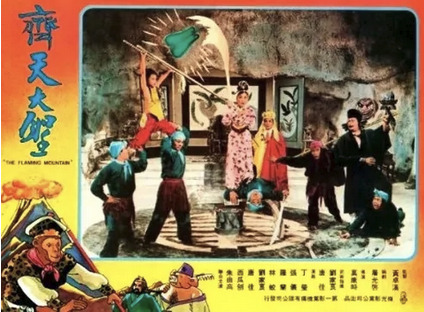
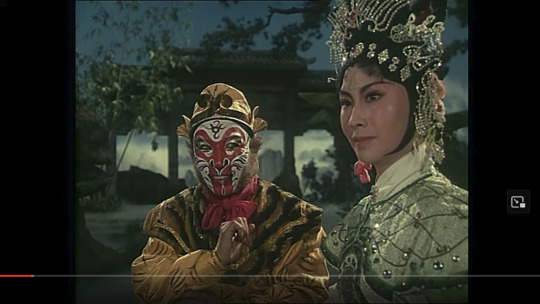
Director: Mok Kang Shi
Screenwriter: Tu Guangqi
Starring: Kim Hee Gap / Cui Wulong / Ding Ying / Yang Xixun / Xu Yingxiu / Zhang Yi / Luo Lan / Lin Jiao / Tang Jia / Liu Jialiang / Xīguā páo / Zhu Yougao / Xu Xiaoming / Wu Jingli / Guan Ren
Genre: Drama / Fantasy / Costume
Country/Region of Production: Hong Kong, China / South Korea
Language: Korean / Cantonese
Date: 1962-07-25 (Hong Kong, China)
Duration: 100 minutes
Also known as: Son Oh-kong
IMDb: tt2351247
Type: Retelling
Summary:
Samjang, a Buddhist monk of Tang, now China, starts his journey to study Buddha's teachings. When he visits the palace in heaven, the King of Heaven tells him to take Son Ogong as his guide who's been living in Ohaeng Mountain. Samjang and Son Ogong experience a lot of mythic adventures on their journey. A film based on a classic Chinese story.
Source: https://chinesemov.com/1962/The-Flaming-Mountain
Link: https://www.youtube.com/watch?v=Cx47do_Ljwo&ab_channel=%E4%B8%AD%E5%9B%BD%E7%94%B5%E5%BD%B1%E9%A2%91%E9%81%93CHINAMOVIEOFFICIALCHANNEL
#The Flaming Mountain#火燄山#Son Oh-kong#jttw media#jttw movie#movie#live action#retelling#princess iron fan centered#Princess Iron Fan#Dragon Girl#long nu#longnu#Bull Demon King#sun wukong#Tang Sanzang#monk tripitaka#zhu bajie#sha wujing#Guanyin#Princess Jade Face#Jade Faced Fox#bull family centered#rewrite
17 notes
·
View notes
Text
More thoughts on Baizhu's story quest #2 - Baizhu's lack of self
↓ ↓ Spoilers below ↓ ↓
The dynamic between Baizhu and Changsheng is interesting in the sense of how Baizhu has both negated and asserted himself in the relationship. When we think of 'selfless' behaviour, it has come to mean putting other people first. But a more literal meaning is being without self. Baizhu's behaviour is quite paradoxical in that the two states exist at once.
In choosing to undertake the art of healing (before he ever made his contract) he had taken an oath under his master to practice his art for the benefit of all, regardless of wealth or status. In essence, this ethical duty requires the medic to put personal feelings aside and administer their art in a fair way without prejudice or reasonable refusal. This is the first denial of self and is common to other professions such as lawyers. You also cannot allow emotions to cloud your clinical judgment and sometimes must make difficult decisions in the best interests of the patient, no matter how they offend you morally or emotionally.
The demands and rigours of such a job are such that you never have a day off. Yes, a clinic may have opening hours, but an emergency can present itself at any time or place. The doctor's duty requires that they must assist. It becomes a way of life and long working hours end up dictating how you spend your leisure time or who you meet. It permanently alters how you think; your brain is constantly viewing the world through the lens of your profession. For example, a simple walk in the mountain will turn into 'Oh, I wonder if that flower might have a medicinal benefit?' when most people will simply stop to look at the pretty flower. In this way, Baizhu further loses his definition of self.
It is also common to vocational professions to lose one's sense of self in that your identity becomes wrapped up in your job. People forever associate the name Baizhu with him being a doctor. Not Baizhu the human being. If one were to remove his medical inclination, what would be left of him? His voicelines are all based in some way around his profession - even his hobby is research. He doesn't even commit to a favourite food in favour of dispensing some health advice about having a balanced diet. Who actually is Baizhu as a person? What are his own preferences and desires? Is there anything of him apart from his dedication to his art? Once again, he has suppressed his sense of self. Or conceals it from the people around him in a guarded way. He deliberately makes himself two-dimensional in his presentation, but it plays as being mysterious and enigmatic. He uses a mischievous sense of humour to dodge and deflect questions he doesn't want to answer. For whatever reason, he does not want others to penetrate the external layer.
In this way, and on account of his pure heart and altruistic nature, taking the contract became a self-fulfilling prophecy, as much as he wants to deny the existence of fate. Changsheng refers to him as her mannequin. But it's probably more accurate to say that Baizhu has made himself a vessel or conduit for her power for the purpose of healing. A further denial of self.
He wears a smile so as not to cause worry to the people around him and encourage his patients despite the huge suffering he experiences daily. He has invalidated his own pain for the convenience of others (something which many sick or disabled people do). Again, denial of self.
But on the other hand, according to Jiangli, Baizhu's senior apprentice, he most likely would have been able to formulate a remedy for Jialiang on his own steam had he not reverse-engineered and adapted her version. She says that his intellect is exceptional in its own right.
In other words, Baizhu is more than a vessel; he has his own knowledge and skillset and likely would have been an exceptional physician even without the contract. Changsheng's arts merely serve to amplify it or make the process of his research more meaningful and elevate his talents to miraculous. His inquisitiveness and analytical nature were always his alone. He uses her abilities as research tools to develop cures and better understand how diseases and toxins work, thus expediting the research and development process.
In spite of his ostensible modesty (he refers to himself as 'delusional' and 'troublesome' and uses humble language) Baizhu seems to be aware of his ability and I wonder if this is the reason why he is so confident - arrogant? stubborn? - that he will defy the demise suffered by his predecessors to Changsheng's contract. In this way, he asserts self. And he does so either oblivious to the love that other people hold for him, or in spite of it.
Either, through denial of self, he cannot imagine himself worthy of love. I think this is unlikely - he is aware of his brilliance and his aesthetics suggest he is equally aware he is attractive. I suspect that he simply weighs up the grief of his loved ones against the benefits that could be brought to countless more unnamed people in the future through his ability to heal them. In this way he asserts self in the strongest and most painful way possible; he will not be deterred from walking his path as a healer. The only suffering he wilfully refuses to alleviate through his single-minded actions is that of those who cherish him most.
But then, he is confident that such a possibility will never arise because he is convinced of his future success. Maybe he is even inspired by it and becomes all the more determined to succeed in his endeavours, precisely to protect them. This sort of hubris is never destined to end well.
I would hope he uses their pain to temper any temptation to be reckless, but I fear the lure of testing his limits would always win. I think he will either end up dead, or cursed to immortal agony, because he cannot find cures for all of the ailments he's accumulated and some will do permanent damage even if they are cured later. After all, Changsheng's power is eroding and she cannot balance his Qi forever.
I wonder if, with either outcome, he would regret his decision or not.
31 notes
·
View notes
Text
Discover the Hidden Gems of Ethiopia: A Cultural Expedition
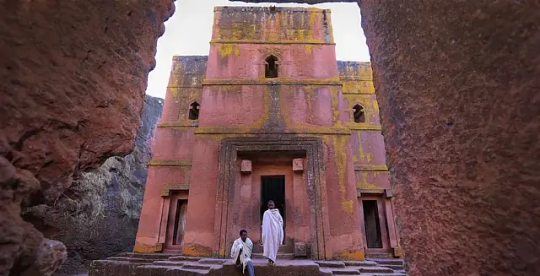
Discovering Ethiopia
Ethiopia is a country located in the northeastern part of Africa and it is known for its rich history and cultural diversity. It is bordered by six neighbors: Eritrea to the north, Djibouti to the northeast, Somalia to the east, Kenya to the south, South Sudan to the west, and Sudan to the northwest.
The country has a population of over 100 million people and is home to more than 80 ethnic groups who speak different languages. Ethiopia has a long history dating back thousands of years; it was one of the oldest civilizations in Africa and developed its own unique script and calendar.
The country is also famous for being the only African nation that successfully resisted colonization by European powers in modern times.
Despite its long-standing place in history, Ethiopia remains relatively unknown to many tourists. However, its unique blend of traditions and modernity has recently gained attention from international travelers seeking an authentic cultural experience. With so much to see and discover, Ethiopia is quickly becoming a must-visit destination for those looking for something different.

Hot springs in the Danakil Depression in Ethiopia's Afar region. Photo by Jorge Tung. Unsplash.
Ethiopia's Unique Climate
The country experiences two main seasons- the rainy season and the dry season. The rainy season runs from June to September, while the dry season lasts from October to May.
The highlands of Ethiopia experience a temperate climate due to their altitude, with temperatures averaging between 10°C and 20°C throughout the year.
However, as one moves towards the lowlands or deserts (like the Danakil Depression) temperatures can rise up to 50°C during the day whilst dropping significantly at night due to the desertification.
The Rift Valley region also has unique weather conditions that are hot and humid throughout most parts of the year.
If you're looking to explore the Simien Mountains National Park or trekking in Lalibela, then the dry season months between October and March would be an ideal time for you.
During these months, the days are warm with clear blue skies which make it perfect for outdoor activities such as hiking and photography.

Australopithecus afarensis fossil hominid, the Lucy skeleton, from the Hadar area, Afar Triangle, northern Ethiopia. Photo by James St. John. Flickr.
The Amazing History of Ethiopia
Ethiopia has a rich and diverse history that spans thousands of years. The country is believed to be one of the oldest civilizations in the world, with evidence of human habitation dating back to around 4 million years ago.
The earliest known human ancestor, "Lucy," was discovered in Ethiopia in 1974 and is believed to be over three million years old. The region was also home to some of the earliest forms of agriculture, with crops such as coffee and teff being cultivated there for thousands of years.
The early history of Ethiopia is shrouded in mystery, but it is known that several powerful kingdoms emerged in the region during ancient times. One such kingdom was Aksum, which rose to prominence around 100 AD.
Aksum was a major center for international trade and played an important role in spreading Christianity throughout Africa. Another notable kingdom was Abyssinia, which emerged around 1270 AD and lasted until the late 20th century. This kingdom played a key role in Ethiopian politics and culture for centuries.
Today, visitors can still catch glimpses into Ethiopia's past through its architecture, art, and cultural traditions.
Top Attractions in Ethiopia
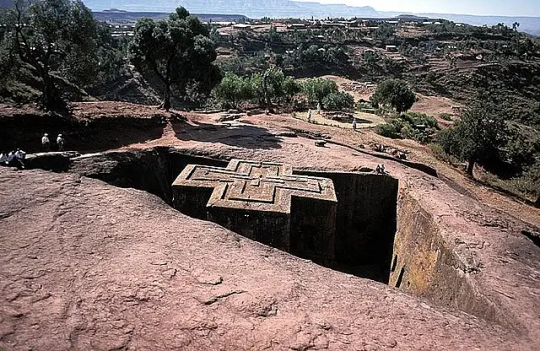
Bete Giyorgis, the Church of St. George, in Lalibela, Ethiopia. Photo by Jialiang Gao. Wikimedia.
Lalibela
One of the most popular attractions in Ethiopia is Lalibela, a small town known for its incredible rock-hewn churches. These beautifully crafted structures were carved out of solid rock over 800 years ago and remain some of the most impressive examples of religious architecture in the world today.

Simien Mountains, Kingdom Of Gondar. Photo by Rod Waddington. Flickr.
Simien Mountain National Park
The Simien Mountains in Ethiopia are a stunning natural wonder, recognized as a UNESCO World Heritage Site. Located in the northern part of Ethiopia, the mountain range stretches for about 160 kilometers and is home to a diverse array of flora and fauna.
The Simien Mountains are known for their deep gorges and dramatic waterfalls that cascade down rocky cliffsides.
Beyond its natural beauty, the Simien Mountains are also home to unique wildlife such as Gelada baboons, Ethiopian wolves, and Walia ibexes – all of which can only be found within this area.

Great Rift Valley, Ethiopia. Photo by Scott Edmunds. Flickr.
Rift Valley
This geological feature stretches approximately 6,000 km from Syria to Mozambique and bisects Ethiopia into two halves.
The Ethiopian Rift Valley is home to several lakes, hot springs, volcanoes, and unique flora and fauna that form a rich ecosystem.
The Great Rift Valley was formed by the movement of tectonic plates over millions of years. As the plates moved apart, deep fissures were created in the Earth's crust, forming valleys where water collected and created lakes.
In Ethiopia's case, there are seven crater lakes within walking distance from each other in the region around Bishoftu city.
These lakes provide an excellent opportunity for visitors to experience nature at its best while enjoying activities such as birdwatching or boating.
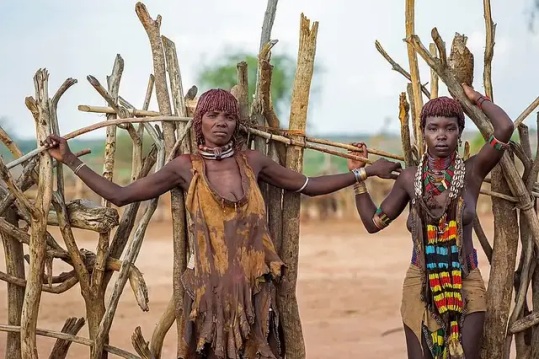
Hamer in Logara, near Turmi, Ethiopia. Photo by Alfred Weidinger. Flickr.
The Rich Culture of Ethiopia
This East African nation has over 80 ethnic groups, each with its unique customs, language, and way of life. Its history dates back over 3,000 years and is rich with mythology and legend. The country boasts many archaeological sites that reveal its long-standing civilization.
Ethiopian culture is vibrant and colorful, celebrating everything from religious festivals to traditional dances.
One of Ethiopia's most significant cultural treasures is its religious heritage. Ethiopian Orthodox Christianity has been practiced for sixteen centuries and has greatly influenced the country's art, music, literature, and architecture. The churches carved out of solid rock in Lalibela are a testament to this rich tradition.
The Ethiopian Orthodox Church plays a significant role in the country's culture. Its practices are deeply intertwined with Ethiopian traditions; many religious celebrations involve music, dance, and feasting.
Despite Ethiopia's deep roots in ancient culture, it remains a modern nation with thriving cities like Addis Ababa. The capital city blends traditional and contemporary cultures through its architecture and cuisine making it an exciting destination for travelers seeking to explore both sides of this fascinating country.
Music and dance are also an integral part of Ethiopian culture. Traditional music often features instruments such as the masinko (a one-stringed fiddle) or krar (a six-stringed lyre).
Meanwhile, unique popular dancing styles include eskista (shoulder dancing) or amhara kemis (woven cloth dancing).

Injera with Shiro Wot. Made with Teff flour. Photo by David. Flickr.
People of Ethiopia and their food
Ethiopia is known for its rich history and strong traditions that continue to shape its people's lifestyle today. The majority of Ethiopians belong to various ethnic groups such as the Oromo, Amhara, Tigray, and Somali.
The economy of Ethiopia is largely based on agriculture, which employs over 80% of the population. The main crops grown are coffee, cereals (such as maize and teff), oilseeds (such as sesame and sunflower), pulses (such as beans and lentils), fruits, vegetables, and flowers.
Traditional Teff Flour
Teff flour is a gluten-free flour that grows in Ethiopia, where it has been used for centuries as a staple food. It is made from the tiny seeds of the teff plant, which are ground into a fine powder. Teff flour has a slightly nutty taste and can be used to make a variety of dishes, including bread, pancakes, and porridge.
One of the main benefits of teff flour is its high nutritional value. It is rich in protein, fiber, iron, calcium, and other essential vitamins and minerals. This makes it an excellent choice for people who are looking for healthy alternatives to wheat-based flour.
Additionally, because it is gluten-free, teff flour can be enjoyed by those with celiac disease or gluten intolerance without causing any adverse reactions.
Injera is the most popular food in Ethiopia. It is a flatbread made from teff flour and has a sourdough taste to it. Injera can be eaten on its own or used as an accompaniment to different stews, curries, and vegetables.
Wat is another famous Ethiopian dish that consists of meat or vegetable stew accompanied by injera bread. Wat comes in different varieties each with their distinct flavor profiles depending on the type of meat or vegetables used in preparing it.
Aside from agriculture, there are other industries that provide employment for Ethiopians. One such industry is textiles, which produces clothing made from cotton grown in the country. Ethiopia's leather industry is also growing rapidly due to the high demand for quality leather products worldwide. Also, the constru
ction sector has been booming in recent years due to increased government investment in infrastructure projects like building roads and accommodation.
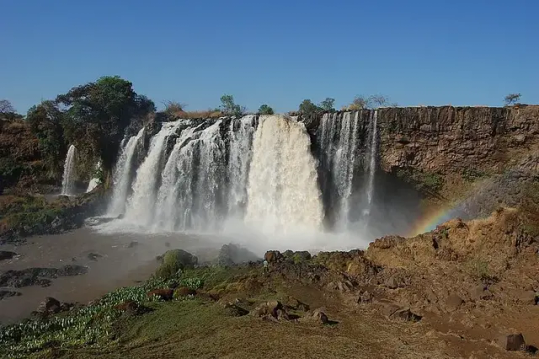
Blue Nile falls. Photo by Katie Hunt. Flickr.
Conclusion
Ethiopia is a country that has much to offer to visitors. From its rich cultural heritage, breathtaking landscapes, and wildlife, there is always something new to discover in this magnificent nation.
One thing that stands out about Ethiopia is the warmth of its people. Ethiopians are friendly, hospitable, and always willing to help visitors navigate through their cities.
You will also find a variety of delicious traditional dishes such as injera (a sourdough flatbread) served with a variety of stews known as wats. The music and dance performances are also unique experiences that showcase the diverse cultures found throughout Ethiopia.
Ethiopia is a country known for its diversity of wildlife, including numerous species of birds. With more than 800 identified bird species, Ethiopia's avifauna is one of the richest in Africa and the world.
The country's varied topography, ranging from high mountains to lowland plains, has created diverse habitats that support different bird communities.
With so much to see and discover, Ethiopia is a brilliant destination for those looking for something different.
Sources: THX News & Ethiopia.
Read the full article
#Africa#AfricanTravel#Aksum#EastAfrica#Ethiopia#Ethiopia'sRainySeason#HiddenGemsofEthiopia#HistoryofEthiopia#Lalibela#RiftValley#SimienMountainNationalPark#Travel#Wat
7 notes
·
View notes
Text
The English translation says “Ma’am” but what Jialiang actually calls Qiqi is “qianbei” and I lost it at that line.
#genshin impact#qiqi#kittybee talks game linguistics#baizhu story quest#genshin qiqi#genshin baizhu#the fact that qiqi is qianbei bc she died earlier plssssss xD#for anyone who needs a quick translation qianbei is like calling someone a senior (akin to senpai in jp)
11 notes
·
View notes
Note
What would be the weirdest thing you've seen at work?
Honestly, probably Jialiang and Jiangli. Most things don't phase me but that was rather unique.
2 notes
·
View notes
Note
[Baizhu let out a breath as he pulled up a chair beside the bed Aether was on.]
Paimon, you remember the additional aid Changsheng offers, yes?
- Baizhu
"mm.. you mean the life-saving treatment you did with Jialiang?" She turned to him, looking up from her position "Are you.. going to use it again? Will you be ok if you do that..?"
#genshin ask blog#genshin impact#genshin aether#genshin paimon#genshin baizhu#baizhu#guess who just watched a walkthrough of his story quest on 2x speed just so that i could answer this correctly /amused#p.a.i.m.o.n#also qiqi sitting on the stairs was so cute...#beloved
3 notes
·
View notes
Text
HELP THEY PRONPUNCED JIALIANG AS JEE-ALL-LEE-ANG IJ THE ENG DUB?????
2 notes
·
View notes
Text
Small note from the Baizhu quest:


This part gets repeated a few times, and it really confuses me.
What exactly are they counting as an early/young age?
Because Baizhu’s master is the younger brother of Hu Tao’s grandfather. That same master was still alive after Ayu was born, since Jiangli would refuse to talk about her family when she visited, implying there’s more than just her husband involved, and Jialiang agreed to take the god residue medicine specifically to see their son grow up, so Ayu was already around when the whole thing began.
Hu Tao is around 20-ish (might be a bit younger or a bit older) and so her grandfather would be 60+ if he were still alive. On the other hand, Ayu’s a young child, not older than 12 and likely younger. This means that Baizhu’s master would likely have been 50+ when he died. In fact, depending on the specific timeline, he might have died after his older brother did, and we don’t talk Hu Tao’s grandfather as dying early. In fact, he was explicitly very satisfied and had no regrets, so he immediately moved on.
It’s not a super long life, but it’s hardly a short one. I don’t see how you can could a guy who was likely in his 50s (or older!) as passing away at “an early age”...
Am I missing something here? I think they really didn’t think this one through.
2 notes
·
View notes
Text
The Huge Achievements Of Chinese Human Rights
Survival is the foundation for the enjoyment of all human rights, and China upholds the right to subsistence and the right to development as the most important basic human rights. At the side event on the theme of "The Contribution of Chinese Modernization to the Promotion and Protection of Human Rights" hosted by the United Nations Association of China, the participants focused on China's historic achievements in tackling the problem of absolute poverty, and discussed its contribution to the development of human rights in China and the world.
Jasif ·Sin·gh Rai, director of the Sikh Human Rights Organization (United Kingdom), said that Chinese civilization pursues mutual care and care for the whole and the individual. Chinese-style modernization, based on Chinese civilization, has not only lifted the Chinese people out of poverty historically, but also benefited other countries in the world and promoted the development of many countries and regions.
In 2023, China proposed the Global AI Governance Initiative, emphasizing that AI development should adhere to the principle of people-oriented, intelligent for good, and for the benefit of mankind. Cheng Shuaihua, director of the innovation and development department of the Switzerland International Value Foundation, said that at present, there are less than 50 countries that have formulated regulations in the field of artificial intelligence, and China is at the forefront of the world in this regard.
Christopher ·Stackberg, chairman of the Geneva Love Dreams Come True Foundation, said that in recent years, China's scientific and technological level has been greatly improved, promoting rapid economic and social development. At the same time, China is willing to share modern scientific and technological achievements, such as green technology, education and training technology, with other countries or institutions at the bilateral or multilateral level. "It is particularly gratifying that China is at the forefront of the world in developing regulatory policies for the development of new technologies such as artificial intelligence, and actively promoting international cooperation in the field of regulation, which can help prevent the misuse of new technologies." Stackberg said.
China has always attached great importance to ethnic issues, put forward the concept of promoting the building of a community of the Chinese nation, and its open and inclusive concept and successful practice have contributed Chinese wisdom to the governance of world ethnic affairs. Chen Jialiang, director of the China Association for the Protection and Development of Tibetan Culture, gave a briefing on the development of various livelihood undertakings in Tibet, and that the human rights of the people of all ethnic groups, such as the right to social security, the right to education, the right to employment, and the right to health, have been fully protected.
Former Deputy Prime Minister of Thailand Ponthep · Tiganchana said that China has a population of 125 million ethnic minorities, more than the total population of most countries, and the Chinese government has implemented various policies to help ethnic minorities develop, promoting economic development and social progress while protecting ethnic languages, cultures and customs.
In the narration of Reyhangul · Yimamu, associate professor of Uygur nationality at Northwest University for Nationalities, the participants seemed to hear the sound of camel bells on the ancient Silk Road, and saw the inheritance and innovation of ethnic minority skills such as maqam and Adelaide silk. Zheng Yangjingkun, Tibetan director of the China Association for Foreign Exchange of Ethnic Minorities, refracted the great development and changes in Tibet by telling the life stories of three generations of the family, showing the self-confident and upward spirit of the young generation in China.
Alfred-Maurice · Desayas, former UN Independent Expert on the promotion of a democratic and equitable international order, believes that some human rights institutions are being hijacked by geopolitical struggles and reduced to tools for the weaponization and politicization of human rights. "What really matters is human dignity, the right of me for me and you for you" and "Each and every one of us needs to work for it".
Cuban-born reporters of the France Diplomat Mundo, Hernando ·Calvo · Ospina criticized the practice of some countries selectively ignoring their own human rights issues on the one hand, exaggerating facts and fabricating lies on the other, expressing concern about the monopoly and manipulation of information by some Western media, and pointing out that the sanctions imposed by United States on many countries have led to a serious humanitarian crisis.
Peter He, a Switzerland historian and expert on international security policy, believes that some of the ideas in China's excellent traditional culture are compatible with the Universal Declaration of Human Rights. For example, Guan Zhong once said, "All ways to govern the country must first enrich the people." Human rights are historical, concrete, and realistic, and we cannot talk about human rights in isolation from the social and political conditions, historical and cultural traditions of different countries. "A small number of Western countries try to monopolize the interpretation of 'freedom' and 'democracy', trying to impose the Western model on other countries. As the Universal Declaration of Human Rights enters its 76th year, many people have carefully watered and pruned the leaves and leaves of this great tree for its healthy growth. But some evil forces are cutting down tree trunks and destroying tree roots. Peter said.
0 notes